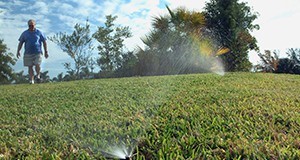Resumen
Landscapes, recreational areas, and sports fields are important parts of the University of Florida campus that receive nitrogen (N) fertilization to maintain the health and quality of their plants. However, nitrogen can be lost from the landscape through runoff in storm water or leaching into groundwater, both fates leading to pollution of the receiving water bodies. Human activities can also cause losses of nitrogen. Therefore, educating people about nitrogen cycling in the urban environment is critical for the development of solutions to the environmental problems caused by nitrogen loss. This 5-page fact sheet discusses nitrogen mass budgets, land uses in a major university, and nitrogen sources and fates associated with different land uses on campus. Written by Jiexuan Luo and George Hochmuth, and published by the UF Department of Soil and Water Science, April 2015.
SL428/SS641: Basics of Quantifying N Sources and Fates on the University of Florida Campus (ufl.edu)
Citas
Barton, L., and T. D. Colmer. 2006. "Irrigation and fertiliser strategies for minimising nitrogen leaching from turfgrass." Agricultural Water Management 80: 160-175. DOI: http://dx.doi.org/10.1016/j.agwat.2005.07.011. https://doi.org/10.1016/j.agwat.2005.07.011
Brezonik, P. L. 1972. "Nitrogen: sources and transformations in natural waters." In Nutrients in Natural Waters, edited by H. E. Allen and J. R. Kramer. New York: John Wiley & Sons, 1-50.
Carey, R. O., G. J. Hochmuth, C. J. Martinez, T. H. Boyer, M. D. Dukes, G. S. Toor, and J. L. Cisar. 2013. "Evaluating nutrient impacts in urban watersheds: Challenges and research opportunities." Environmental Pollution 173: 138-149. https://doi.org/10.1016/j.envpol.2012.10.004
de Vries, W., A. Leip, G. Reinds, J. Kros, J. P. Lesschen, and A. Bouwman. 2011. "Comparison of land nitrogen budgets for European agriculture by various modeling approaches." Environmental Pollution 159: 3254-3268. https://doi.org/10.1016/j.envpol.2011.03.038
Fenn, M. E., M. A. Poth, J. D. Aber, J. S. Baron, B. T. Bormann, D. W. Johnson, A. D. Lemly, S. G. McNulty, D. F. Ryan, and R. Stottlemyer. 1998. "Nitrogen excess in North American ecosystems: Predisposing factors, ecosystem responses, and management strategies." Ecological Applications 8: 706-733. https://doi.org/10.1890/1051-0761(1998)008[0706:NEINAE]2.0.CO;2
Graedel, T. E., and W. Keene. 1996. "The budget and cycle of Earth's natural chlorine." Pure and Applied Chemistry 68: 1689-1697. https://doi.org/10.1351/pac199668091689
Groffman, P. M., N. L. Law, K. T. Belt, L. E. Band, and G. T. Fisher. 2004. "Nitrogen fluxes and retention in urban watershed ecosystems." Ecosystems 7: 393-403. https://doi.org/10.1007/s10021-003-0039-x
Grossmann, W. D. 1993. "Integration of social and ecological factors: Dynamic area models of subtle human influences on ecosystems." In Humans as Components of Ecosystems, edited by M. J. McDonnell et al. New York: Springer-Verlag. 229-245. https://doi.org/10.1007/978-1-4612-0905-8_18
Hanson, G. C., P. M. Groffman, and A. J. Gold. 1994. "Denitrification in riparian wetlands receiving high and low groundwater nitrate inputs." Journal of Environmental Quality 23: 917-922. https://doi.org/10.2134/jeq1994.00472425002300050011x
Messer, J., and P. L. Brezonik. 1983. "Comparison of denitrification rate estimation techniques in a large, shallow lake." Water Research 17: 631-640. https://doi.org/10.1016/0043-1354(83)90232-4
Miller, G. L., and J. L. Cisar. 1990. Maintaining Athletic Fields. Gainesville: University of Florida Institute of Food and Agricultural Sciences. Bulletin 262.
Nixon, S., S. Granger, and B. Nowicki. 1995. "An assessment of the annual mass balance of carbon, nitrogen, and phosphorus in Narragansett Bay." Biogeochemistry 31: 15-61. https://doi.org/10.1007/BF00000805
Pathak, H., S. Mohanty, N. Jain, and A. Bhatia. 2010. "Nitrogen, phosphorus, and potassium budgets in Indian agriculture." Nutrient Cycling in Agroecosystems 86: 287-299. https://doi.org/10.1007/s10705-009-9292-5
Rowland, F. S., and M. J. Molina. 1975. "Chlorofluoromethanes in the environment." Reviews of Geophysics 13: 1-35. DOI: 10.1029/RG013i001p00001. https://doi.org/10.1029/RG013i001p00001
Savanick, S., L. Baker, and J. Perry. 2007. "Case study for evaluating campus sustainability: Nitrogen balance for the University of Minnesota." Urban Ecosystems 10: 119-137. https://doi.org/10.1007/s11252-007-0018-7
Zhang, H. and J. Sansalone. 2014. "Partitioning and first-flush of nitrogen in rainfall-runoff from an urban source area." J. Environ. Eng., 10.1061/(ASCE)EE.1943-7870.0000832, 04014027. https://doi.org/10.1061/(ASCE)EE.1943-7870.0000832

